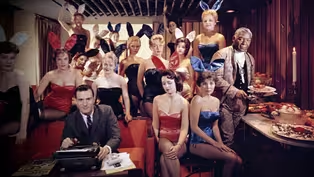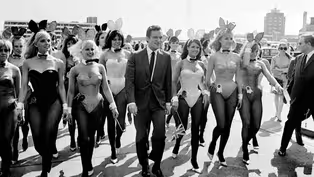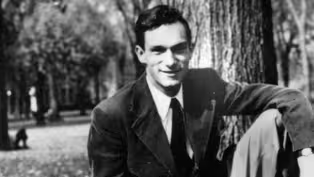Chicago Stories
Extended Interview: Christie Hefner
Clip: 10/18/2024 | 5m 49sVideo has Closed Captions
Christie Hefner, Hugh Hefner’s daughter, talks about her father and Playboy’s philosophy.
Christie Hefner, Hugh Hefner’s daughter and former Playboy CEO, shares her view of her father’s philosophy, examines their relationship, and addresses feminist critiques of the magazine.
Problems playing video? | Closed Captioning Feedback
Problems playing video? | Closed Captioning Feedback
Chicago Stories is a local public television program presented by WTTW
Lead support for CHICAGO STORIES is provided by The Negaunee Foundation. Major support is provided by the Abra Prentice Foundation, Inc. and the TAWANI Foundation.
Chicago Stories
Extended Interview: Christie Hefner
Clip: 10/18/2024 | 5m 49sVideo has Closed Captions
Christie Hefner, Hugh Hefner’s daughter and former Playboy CEO, shares her view of her father’s philosophy, examines their relationship, and addresses feminist critiques of the magazine.
Problems playing video? | Closed Captioning Feedback
How to Watch Chicago Stories
Chicago Stories is available to stream on pbs.org and the free PBS App, available on iPhone, Apple TV, Android TV, Android smartphones, Amazon Fire TV, Amazon Fire Tablet, Roku, Samsung Smart TV, and Vizio.
Providing Support for PBS.org
Learn Moreabout PBS online sponsorship(upbeat sixties music) - I think driving my father was what he thought would make for a healthier society.
He saw Playboy as part of a lifestyle, this period of sort of bachelorhood that was celebratory.
That was a rejection of the religious, puritanical idea that life is a veil of tears.
This was the idea that in fact, life was to be joyful and fun, to humanize our attitude about sex and sexual behavior.
I think on that personal level of what drives any individual, he was kind of an awkward teenager in high school.
He wanted to kind of remake himself into a cool kid.
Playboy, particularly the magazine, was a world that he could create that he could be the coolest kid in town, throw the best parties, hang out with the other cool kids, hang out with beautiful women.
And I think that was enormously satisfying for him.
The first issues of magazine were produced in the South Side apartment that we were living in.
In fact, it was my mother who came up with the name Playmate.
The first idea was it was gonna be Sweetheart of the Month, and she had the idea that you're looking for someone you're gonna share your life with, a playmate.
I was not, however, an early collaborator, as I was in my playpen.
(upbeat music) I had very little time with my father growing up.
I would describe it best as the relationship that someone might have with like a favorite uncle.
I never doubted that he loved me, but he had no idea who my friends were.
He didn't know what I was interested in, in school.
We saw each other like three or four times a year, and that's it.
I thought when I graduated, that I might want a career in journalism.
Then, in fact, he said, if you wanted to, you could intern at the magazine.
And our relationship really became a real relationship when we started working together.
Since I didn't grow up with him, the amount of time we spent together, nevermind sharing this thing that for him was as much a child as his children, was an incredibly deepening and enriching aspect of our relationship.
I think I knew he was smart, but he really, really was smart.
He was strongly opinionated.
People were very loyal to him, but it wasn't because he was someone who handed out a lot of praise, he didn't.
He would've been well served to have done more of that.
And he just didn't, it was not in his DNA.
He became, I think, a kinder, gentler version of himself in his later years.
But he could have done a lot more of that.
(pleasant music) - [Announcer] John Callaway Interviews.
- My guest this evening is Christie Hefner, who is a Vice President of Playboy Enterprises Incorporated.
Have you been comfortable with the way the magazine has treated women over the years, in its presentation of women?
- Pretty much so, I think you have to start from the underlying assumption of the magazine, which is it's for men and not for women.
And therefore, it will basically present women as they relate to men.
I think that a lot of the discomfort that you feel, and the antagonism that has been felt and shouted about has been a misplaced criticism.
And I think to a lot of extent, criticism out of, well, partly ignorance and partly a reduction of the magazine to the center three pages.
I never felt conflicted working there.
And honestly, if I had, I would've left.
I think because I grew up reading the magazine, I had a really strong understanding of what its values were.
So I didn't have the tension that existed in some parts of the women's movement around the nudity in the magazine and my feminism.
But I think Hef always struggled with why he would be attacked by people he felt he'd been an ally to.
On the ERA, on abortion rights, on lesbian custody rights, on equal pay, he so strongly believed in all of that.
There were women on the masthead of the magazine as senior editors.
And he felt that the magazine had always treated women with the utmost respect.
That the portrayal of the women in the magazine was romantic and beautiful.
So he could never wrap his head around the idea that having all of this, why was he being attacked?
And I think part of it was he was, you know, a man born in 1926.
So his attitudes about the role of men and women in relationships was, you know, less progressive, let's just say, than my generation's would be.
I'm not always on his side about critiques of the magazine, but in this one I am.
We ought to wanna live in a world in which we can celebrate romance and sexuality, and not feel that men or women have to sort of choose narrow roles.
People bring a lot of their own attitudes about feminism, about sexuality, about nudity to the magazine.
And therefore, they see through that prism.
And my prism was one that was comfortable with the compatibility between erotic images, sexual freedom, and feminism.
(pleasant music)
The Chicago Playboy Club and Hugh Hefner’s Mansion
Video has Closed Captions
Clip: 10/18/2024 | 7m 58s | Hefner opened the first Playboy Club, followed by his mansion, in Chicago. (7m 58s)
The End of Playboy’s Chicago Era
Video has Closed Captions
Clip: 10/18/2024 | 9m 2s | Playboy’s time in Chicago comes to a close. (9m 2s)
Hugh Hefner and the Origins of Playboy
Video has Closed Captions
Clip: 10/18/2024 | 7m 4s | Hugh Hefner began Playboy magazine from his apartment in Chicago. (7m 4s)
Providing Support for PBS.org
Learn Moreabout PBS online sponsorshipSupport for PBS provided by:
Chicago Stories is a local public television program presented by WTTW
Lead support for CHICAGO STORIES is provided by The Negaunee Foundation. Major support is provided by the Abra Prentice Foundation, Inc. and the TAWANI Foundation.


















